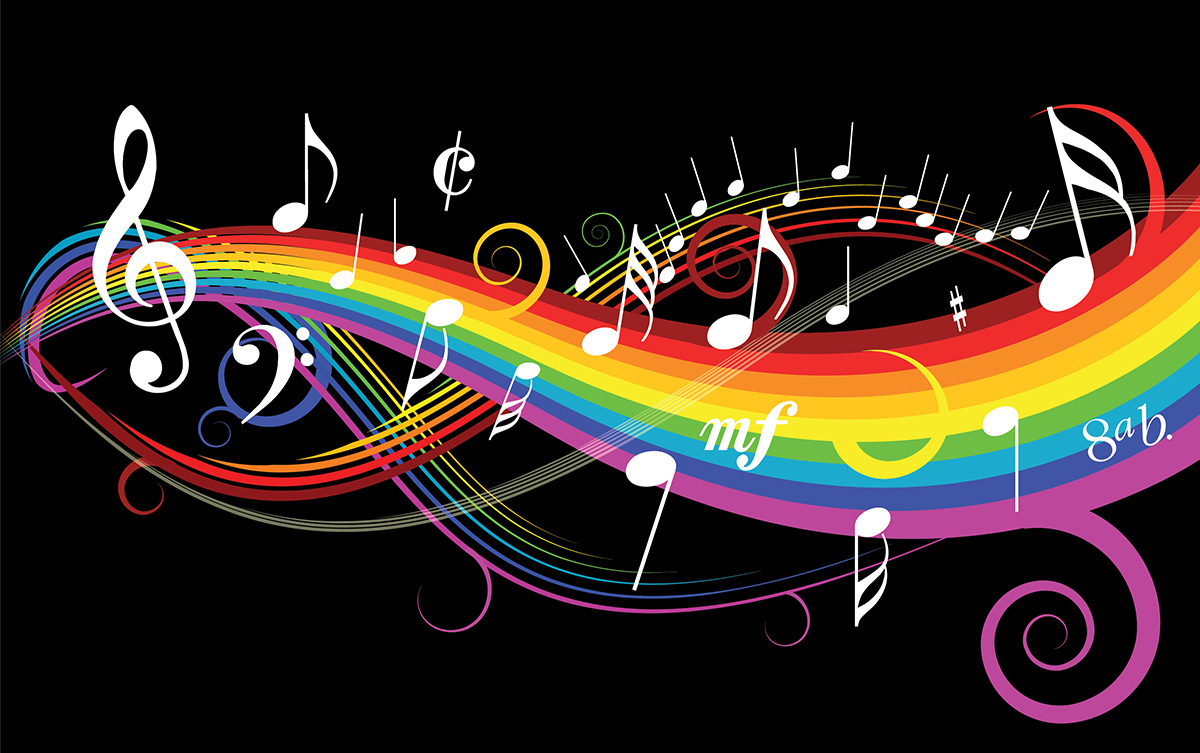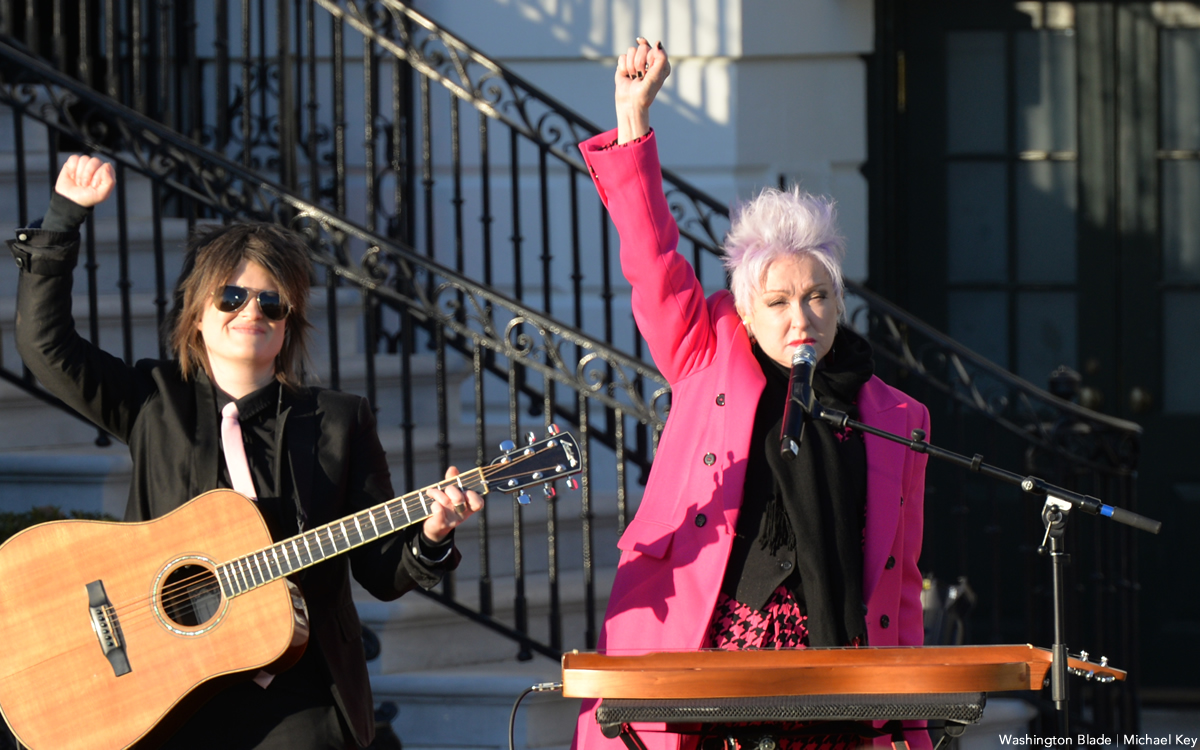Music & Concerts
Tyler Glenn’s ‘Excommunication’ statement
On the outs with Neon Trees, gay frontman cuts loose


Tyler Glenn’s new solo album is more daring than anything he did with former band Neon Trees. (Photo by Meredith Traux)
Utah-based electro-new wave revivalists Neon Trees rode their breakthrough single, 2009’s “Animal,” to an impressive wave of success. Similar stylistically to the Killers (for whom Neon Trees opened) with perhaps a bit more manic energy, Neon Trees’ sound was perfect for a period in which the pop charts were blitzed with ‘80s-inspired electronica.
They scored a Top 10 hit in 2011 with the upbeat dance/pop “Everybody Talks” and their second album “Picture Show” made the Top 20.
Meanwhile, things were changing for lead vocalist Tyler Glenn. Neon Trees were all members of the Mormon Church, which holds a decidedly dim view on homosexuality. Glenn came out publicly as gay in April 2014, just two weeks prior to the release of the band’s all-important third album “Pop Psychology” (which ultimately sold far fewer copies than the band’s first two releases). Glenn’s announcement predictably caused a rift among fans, and it also evidently fractured Glenn’s family and Neon Trees itself.
According to a July 21, 2016 piece in Billboard Magazine, Glenn’s brother and the still-practicing Mormon members of Neon Trees were, at least as of the time of that interview, no longer on speaking terms with the singer. Another reminder, as if we needed one, of the steep price some individuals are forced to pay to be who they truly are as a person and an artist.
The good news for Glenn is that his first solo album, “Excommunication,” is as electrifying and upbeat as anything Neon Trees might have produced and boasts the added poignancy of exploring Glenn literally losing his religion. He addresses this trauma with piercing directness on songs like “G.D.M.M.L. GIRLS (God Didn’t Make Me Like Girls),” an explicit and defiant embrace of his sexuality in the face of superstitious rejection. Glenn pushes back against the condescending term “tolerated” and stands up proudly for exactly who he is.
Glenn has a well-developed sense of caustic sarcasm, which he liberally sprinkles through the album’s nakedly confessional lyrics. He explores the doubt, confusion, rejection and ultimate determination and yearning for freedom that Glenn experienced while going through such a pivotal period in his life. This was a real change in personal spirituality for Glenn. He was a devout Mormon, a true believer and yet he knew he had same-sex attraction from an early age.
That long simmering sense of shame and confusion finally gave way to acceptance, defiance and affirmation that he has every right to be the person he should be and he is in no way lesser than those who choose to follow a mythology that they believe elevates them to a spiritual and moral superiority to their fellow humans. He explores these concepts with a pulsing modern pop energy, an album that’s simultaneously fun and deeply meaningful. On songs like the kinetic “Trash,” Glenn skewers the self-righteous with their own hypocrisy, derisively sneering “one man’s trash is another man’s treasure.”
At times, like on the retro groove “Shameless” and the manic new wave thriller “First Vision,” Jake Shears and Scissor Sisters seem to be an obvious influence on Glenn’s sound, and that’s not a bad thing. Glenn doesn’t stray too far from the general vibe he helped cultivate with Neon Trees, but “Excommunication” is ear candy more daring and sonically adventurous than any of his past work. He also shows himself once again to be a first-rate vocalist, especially on the dramatic ballad “Midnight.”
The album closes with “Devil,” a cunning mix of heavy electronic pop with gospel influences and the recurring hook “I found myself when I lost my faith” that is ultimately the album’s defining theme. Glenn’s solo debut finds himself reveling not only in his ability to finally, without reservation, come to terms with his true self, but in his ability to finally shrug off those who can’t accept it. “Don’t pray for me, don’t pray for me, no,” he sings derisively.
“Excommunication” is not only a declaration of self, it’s a road-map for those who may be where Glenn was several years ago, filled with fear, doubt, confusion and an absence of self-worth. This album is exactly the kind of testimony they need to hear.
Music & Concerts
Washington chorale kicks off Christmas with vibrant program
‘Thine Own Sweet Light’ concerts planned

The full Washington Master Chorale will return for its annual holiday concert tradition with “Thine Own Sweet Light” on Friday, Dec. 19 and Sunday, Dec. 21 at St. Ann’s Catholic Church (D.C.) and Church of the Epiphany (D.C.).
The concert will feature the rich sounds of the 50-voice, a cappella chorus performing lush, seasonal choral music inspired by the theme of light. Highlights include Edvard Grieg’s “Ave Maris Stella,” Eric Whitacre’s “Lux Aurumque,” and Christopher Hoh’s “Holy, Holy, Holy is the Lord God of Hosts.” The program will also present a new work by Barcelona composer Josep Ollé i Sabaté, along with charming holiday folk songs and seasonal favorites.
For more details, visit the Washington Master Chorale website.
Music & Concerts
Queer mega stars (and allies) ready to take D.C. stages this fall
Watch LGBTQ icons light up stages across the DMV as they sing, dance, and drag their way through spectacular shows.

One of the best ways to welcome fall is by catching LGBTQ performers (and their allies) lighting up some of the D.C. area’s biggest stages. From country and pop to drag and rock, the season is packed with shows you won’t want to miss.
Maren Morris – The country, rock, and pop diva—known for hits like “The Bones” and for standing up against Nashville’s anti-LGBTQ voices—takes the stage at Wolf Trap (1551 Trap Rd, Vienna, Va.) on Friday, Sept. 12 at 8 p.m. Tickets start at $64.
RuPaul – The mother of modern drag and host of “RuPaul’s Drag Race” will spin a DJ set at Echostage (2135 Queens Chapel Rd NE) in Northeast D.C. on Sept. 20. Before RuPaul swaps wigs for headphones, Trade and Number 9 owner Ed Bailey will warm up the decks. For tickets and details visit echostage.com.
Conan Gray – The queer pop prince, celebrated for his Gen Z anthems like “Heather” and “Maniac,” brings his Wishbone Pajama Show to EagleBank Arena in Fairfax, VA, (4500 Patriot Cir) on Sept. 20 at 8 p.m. Tickets start at $113. For more info visit shop.conangray.com/pages/tour.
All Things Go Music Festival – With a lineup that includes Noah Kahan, Lucy Dacus, Kesha, Clairo, Doechii, and more, the beloved LGBTQ-friendly festival takes over Merriweather Post Pavilion (10475 Little Patuxent Pkwy, Columbia, Md.) Sept. 26–28. For tickets and details visit allthingsgofestival.com.
BERTHA: Grateful Drag – This unique tribute brings drag artistry and the sounds of the Grateful Dead to The Atlantis (2047 9th St NW) on Sept. 27. Tickets start at $47 at theatlantis.com.
Peach PRC – Rising Australian pop star and out lesbian, whose confessional tracks like “Perfect for You” and “Forever Drunk” have made her a queer TikTok darling, performs at The Atlantis on Sept. 29 at 6:30 p.m. The show is general admission only. Additional details are on theatlantis.com.
Addison Rae – The TikTok star-turned-pop princess, who’s crossed over into music with glossy hits like “Diet Pepsi” brings her sold out show to The Anthem (901 Wharf St., S.W.) on Sept. 30. Tickets are sold out, but resale options start around $80. For more info visit theanthemdc.com.
The Rocky Horror Picture Show 50th Anniversary – Celebrate the cult classic that’s been a queer midnight-movie staple for decades, with Barry Bostwick (a.k.a. Brad Majors) at the Warner Theatre (513 13th St., N.W.) on Oct. 2 at 8 p.m. Tickets start at $41 via Ticketmaster.
Chaka Khan, Patti LaBelle, Gladys Knight & Stephanie Mills – Four legends, one stage. Between Khan’s funk, LaBelle’s soul, Knight’s R&B, and Mills’ powerhouse vocals, this concert at Capital One Arena (601 F St NW) on Oct. 3 at 8 p.m. promises pure diva magic. Tickets start at $103. For more details visit capitalonearena.com.
Lorde – Joined by The Japanese House and Chanel Beads, the Grammy-winning New Zealand singer-songwriter behind “Royals” and “Solar Power” returns to The Anthem on Oct. 4 at 7 p.m. Lorde has long been embraced by queer fans for her dreamy pop and subversive lyrics. For more info visit theanthemdc.com.
Andy Bell (of Erasure) – The British queer rock icon, best known for synth-pop classics like “A Little Respect” and “Chains of Love,” brings his Ten Crowns Tour to the Lincoln Theatre (1215 U St., N.W.) on Friday, Oct. 17 at 8 p.m. Tickets are $90.45.
Doechii – The self-described queer “Swamp Princess”—and WorldPride 2025 headliner—continues her breakout year with the Live from the Swamp Tour at The Anthem on Oct. 21 at 8 p.m. Known for blending rap, R&B, and avant-garde performance art, Doechii is one to watch. Tickets start at $153.
Neon Trees – The out-and-proud Utah rockers behind “Everybody Talks” and “Animal” perform at the Lincoln Theatre on Friday, Oct. 24 at 8 p.m. Lead singer Tyler Glenn, who came out publicly in 2014, has become a strong queer voice in alternative rock. For tickets and info visit impconcerts.com.
Sasha Colby – The “RuPaul’s Drag Race” Season 15 winner strips down on the Stripped II Tour at the Warner Theatre on Nov. 2 at 8 p.m. Tickets available now on Ticketmaster.
Lola Young – The bisexual indie-pop sensation, whose raw songwriting has earned her millions of TikTok fans and multiple chart soaring hits visits The Anthem on Nov. 9 at 8 p.m. Tickets are still available.
Opera Lafayette
Featuring Mary Elizabeth Williams as Dido
+ Elijah McCormack, Chelsea Helm
Oct. 16, 7:30 p.m.
Sixth & I
PostClassical Ensemble
The Pale Blue Do: A Musical Voyage Inspired By Nature
Featuring National Geographic’s Enric Sala, Guest Curator
Wednesday, November 19, 7:30 p.m.
Terrace Theater
Washington Concert Opera
Starring Kate Lindsey, Theo Hoffman, John Moore, and Fran Daniel Laucerica
Nov. 23, 6 p.m.
Lisner Auditorium
Washington Master Chorale
An intimate a capella concert taking place in an architectural jewel, featuring cherished choral gems from Anglican and Catholic tradition and early American hymns. The concert will also present the world premiere of Christopher Hoh’s Holy, Holy, Holy is the Lord God of Hosts, and hymn singing featuring Robert Church, organist and choirmaster at St David’s.
Oct. 18, 7:30 p.m.
October 19, 5 p.m.
St. David’s Episcopal Church
Music & Concerts
Cyndi Lauper ready to have fun in Virginia
Superstar to bring final leg of farewell tour to Jiffy Lube Live

Superstar Cyndi Lauper will bring the final leg of her farewell tour “Girls Just Wanna Have Fun” to Bristow, Va., on Thursday, July 24 at Jiffy Lube Live.
Lauper’s international Farewell Tour – her first major headlining run in a decade – kicked off in North America last October, and included her first time ever headlining (and selling out) Madison Square Garden. Lauper’s performances have earned raves from the New York Times, Rolling Stone, Billboard, and many more, and surprise guests have included Chaka Khan, Sam Smith, and Hayley Williams. The tour just visited the U.K. and Europe, and will head to Australia and Japan in April.
Tickets are available on Live Nation’s website.
-

 Opinions5 days ago
Opinions5 days agoUnconventional love: Or, fuck it, let’s choose each other again
-

 National4 days ago
National4 days agoFour bisexual women on stereotypes, erasure, representation, and joy
-

 Theater4 days ago
Theater4 days agoMagic is happening for Round House’s out stage manager
-

 Baltimore2 days ago
Baltimore2 days ago‘Heated Rivalry’ fandom exposes LGBTQ divide in Baltimore



















